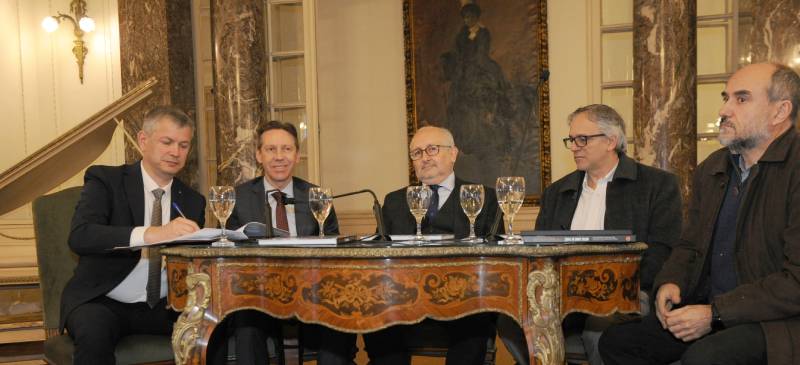- Home
- About us
- News
- Events
- EXPORT Export
-
BUY
Buy
BuyBuyFood and beverage Beef Caviar Dairy Products Fruits Healthy foods Olive oil Processed Foods Rice Sweets, honey and jams Wines ICT Software development Technology products
- INVEST Invest
- COUNTRY BRAND Country Brand
-
INFORMATION CENTER
Information center
InformationCenterInformationCenterReports Country reports Department reports Foreign trade reports Product-Destination worksheet Sectors reports Work documentsStatistical information Classification Uruguay XXI Exports Imports Innovative National Effort Macroeconomic Monitor Tools Buyers Exporters Investors
- Contact
-
Languages
The inauguration of the International Research Laboratory reaffirms Uruguay as a hub of excellence in the sciences
The International Research Laboratory of the French-Uruguayan Institute of Mathematics is now a reality in Uruguay
Share:

The recent establishment of the International Research Laboratory IRL IFUMI (French-Uruguayan Institute of Mathematics and its Interactions) at the Department of Mathematics of the University of the Republic (UdelaR) marks a significant milestone in the scientific collaboration between Uruguay and France.
This laboratory, the result of a close collaboration between the Ministry of Education and Culture, Udelar, the Program for the Development of Basic Sciences (Pedeciba), and the Centre National de la Recherche Scientifique (CNRS) of France, consolidated decades of joint efforts in the field of mathematics and opens new opportunities for interdisciplinary research in the country.
CNRS Director Christophe Besse highlighted this initiative’s importance as a breakthrough in bilateral scientific cooperation and underlined its potential to raise the level of research in Uruguay further.
Besse recalled that collaboration in mathematics between France and Uruguay has been going on for many years and has been possible thanks to the researchers and institutions that initially supported this bilateral activity. He also noted that relations between the two countries in this area grew in recent years thanks to the work of the French-Uruguayan Institute of Mathematics, the bilateral project created in 2009. Since then, it has permanently nurtured other projects and supported mobilities between colleagues in France and Uruguay.
The IRL IFUM of Uruguay is the third laboratory of these characteristics that the CNRS has established in South America, and according to Besse, “After these decades of a close relationship with Udelar and Pedeciba, I am proud to say that our collaboration in mathematics will be taken to a new level.”
The French Ambassador to Uruguay, Jean-Paul Seytre, highlighted the importance of university scientific cooperation for his embassy and added that this cooperation will represent about 100,000 euros in 2024 and is aimed at supporting regional and interdisciplinary scientific programs, as well as scientific or academic projects in the framework of which professors and scientists from both countries are sent or received.
The ambassador also recalled that a few months ago, together with the rector of Udelar, Rodrigo Arim, they inaugurated the Franco-Uruguayan Center for Higher Studies and pointed out that the possibility of establishing a prestigious engineering school in the country is being studied. “We are confident that IFUMI will constitute a valuable opportunity for the development of new productive and inspiring research, and we anticipate its outstanding scientific relevance in both countries,” he concluded.
Uruguay as an R&D hub
Earlier this year, Uruguay had already affirmed its commitment to innovation in the field of life sciences by hosting the first Institut Roche Research Camp outside Europe. This event, which attracted 70 researchers worldwide to Montevideo and Punta del Este, positioned the country as a key destination for developing cutting-edge research.
In addition, the recent unanimous approval by the Uruguayan Parliament to join the Patent Cooperation Treaty further reinforced Uruguay’s attractiveness as a platform for investors and entrepreneurs in the knowledge-based and life sciences sectors. This treaty strengthens the country’s international positioning and opens up new opportunities for scientific collaboration and developing innovative projects.
Uruguay is on its way to consolidating its position as a hub of excellence in life sciences, taking advantage of its solid infrastructure, business-friendly environment, and commitment to innovation.
